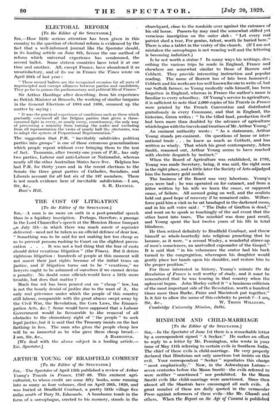ARTHUR YOUNG OF BRADFIELD COMBUST [To the Editor of the
SPECTATOR.] SIR,---The Spectator of April 13th published a review of Arthur Young's Travels in France, 1787-89. This eminent agri- culturist, to whose credit are some fifty books, some running into as many as four volumes, died on April 20th, 1820, and was buried at Bradfield. Combust, a pretty little village five miles south of Bury St. Edmunds. A' handsome tomb in the form of a sarcophagus, erected to his memory, stands in the
churchyard, close to, the roadside over against the entrance of his old home. Passers-by may read the somewhat stilted yet veracious inscription on the outer slab : " Let every real patriot shed a tear, For genius, talent, worth lie buried here."
There is also a tablet in the vestry of the church. (If I am not mistaken the sarcophagus is not wearing well and the lettering is becoming indistinct.) Is he not worth a statue ? In many ways his writings, des,- cribing the various trips he made in England, France and elsewhere are somewhat similar to those of Borrow and Cobbett. They provide interesting instruction and popular reading. The name of Borrow has of late been honoured ; Cobbett and his works are too well known for one to write of, but our Suffolk farmer, as Young modestly calls himself, has been forgotten in England, whereas in France the author's name is familiar to every schoolboy. Of Young's service to agriculture, it is sufficient to note that 2,000 copies of his Travels in France were printed by the French Convention and distributed gratuitously in every Commune, and that in England, the historian, Green writes : " In the tilled land, production itself had been more than doubled by the advance of agriculture which began with the travels and treatises of Mr. Arthur Young."
An eminent authority wrote : " As a statesman, Arthur Young stands pre-eminent. On questions of home or inter- national trade . . . he knew as much as Cobbett, and has written as wisely. That which his great contemporary, Adam Smith, reasoned out, Arthur Young seems to have reached with electric despatch by instinct."
When the Board of Agriculture was established, in 1793, Young was made Secretary, being, it was said, the right man in the right place, and a little later the Society of Arts adjudged him the honorary gold medal.
The business of the Board was very laborious. Young's eyes were bad ; he was operated on for cataract, and from a letter written by his wife we learn the cause, or supposed cause, of failure. All seemed going on well, and the oculists held out good hope of recovery if he remained calm. Wilber- force paid him a visit as he sat bandaged in the darkened room, and in his soft voice said : " The Duke of Grafton is dead," and went on to speak so touchingly of the sad event that the other burst into tears. The mischief was done past recall, and Young spent the last twelve years of his life in total blindness.
He then retired definitely to Bradfield Combust, and threw himself so whole-heartedly into religious preaching that he became, as it were, " a second Wesley, a wonderful stirrer-up of men's consciences, an unrivalled expounder of the Gospel." It is said that " in his vehemence the orator had his back turned to the congregation, whereupon his daughter would gently place her hands upon his shoulder, and restore him to the proper position."
For those interested in history, Young's minute On the Revolution of France is well worthy of study, and it must be remembered that he was touring in that country when the upheaval began. John Morley called it " a luminous criticism of the most important side of the Revolution, worth a hundred times more than Burke, Paine and Macintosh put together." Is it fair to allow the name of this celebrity to perish ?—I arnj
















































 Previous page
Previous page